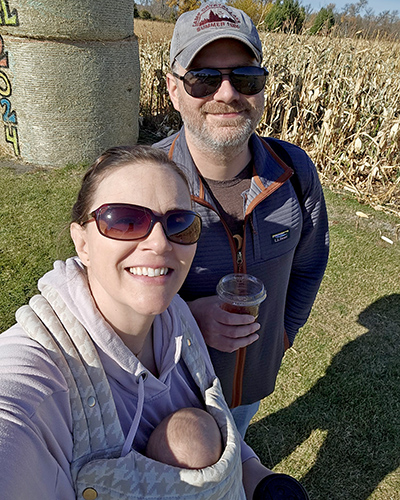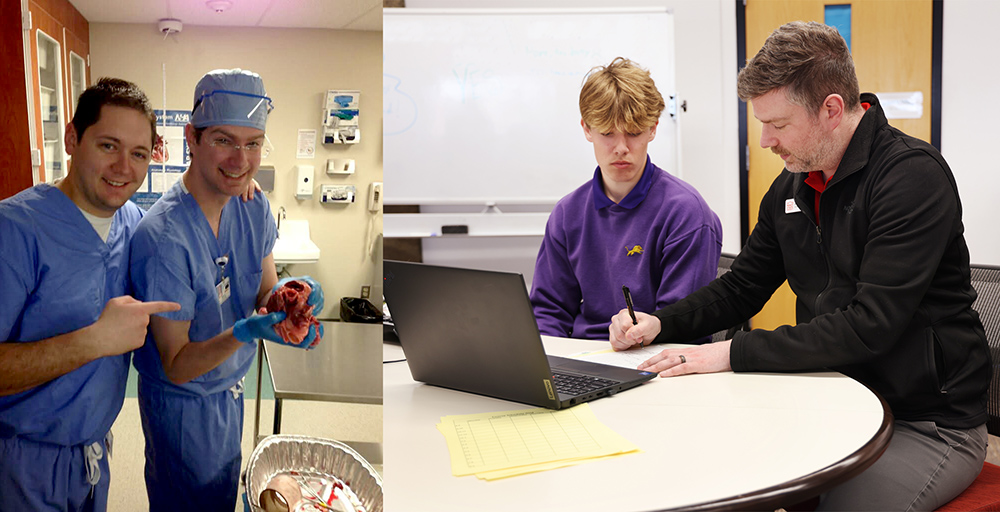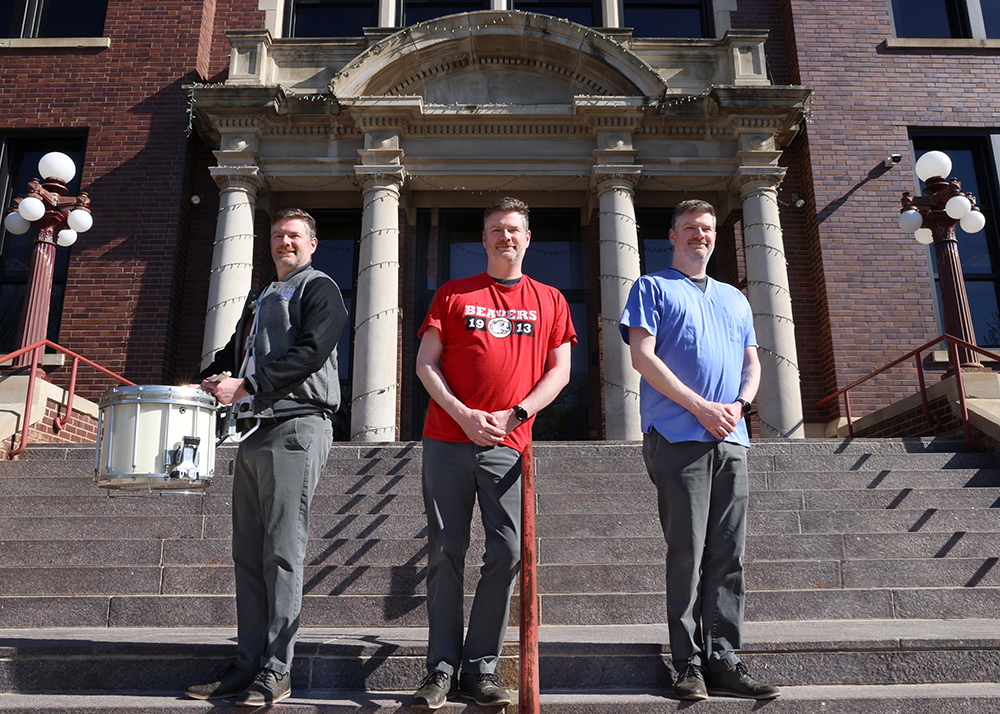Pietrzak’s long road to the right place in education

Eric Pietrzak’s journey reflects resilience, reinvention, and a deep commitment to student success.
Pietrzak, academic advisor in the Minot State Department of Nursing and cardiovascular invasive specialist, has a diverse group of inspiring individuals who have shaped his MSU experience. Through a remarkable personal and professional journey, Pietrzak has had a meaningful impact on students navigating their own paths.
He didn’t follow a straight path to higher education. His early academic years were filled with passion but not always direction.
“Oh goodness, where should I start? It feels like I’ve done a little bit of everything, though I’ve spent most of my time working in healthcare,” Pietrzak said. “Education is something of a second career for me.
“I grew up in Michigan and went to college right out of high school, and while I was a great student, I hadn’t quite figured out how to finish the things that I started. I must have had half a dozen completely unrelated majors over the course of what I call my ‘all engine, no rudder’ years. Don’t get me wrong, I loved everything I studied: philosophy, anthropology, theater, chemistry, physics. It just felt good to be in a university classroom, so I learned everything I could.”
He filled his days with meaningful experiences, including the debate team, theater work, and music, but eventually felt the weight of time and unfinished goals.
“Unfortunately, after about five or six years, I hadn’t made any real progress towards actually finishing a degree,” Pietrzak said. “I started to struggle with feeling aimless and lost, so I decided to take a break to step back from school. I felt like it was taking so long to figure out who I was and what I wanted, and I started wondering if there was some lesson that everyone else got that I had somehow missed that was holding me back.”
That break led him down unexpected paths, including working in crawl spaces at two in the morning until a pivotal realization pushed him to seek something different.
“I got a job working for a water damage restoration company, and one night I was doing an emergency call in somebody’s crawl space with a whole bunch of sewage at 2 a.m., and I thought, geez, I’m really not enjoying myself,” Pietrzak said. “I’d like to be doing something different, so it’s probably time to go back to school.”
He returned to education, this time with more purpose and direction, and found himself drawn into the world of surgery.
“I grew up in a family of nurses, and I knew nursing wasn’t right for me. I applied to a tech school for surgery and ended up falling in love with the discipline, the environment, the people, everything,” Pietrzak said. “I earned a technical certificate, and off I went.”
Pietrzak quickly found his niche in cardiothoracic and vascular surgery, thriving in the intensity of the OR and earning additional credentials as a registered cardiovascular invasive specialist.
“I honestly thought I could do it forever, but life didn’t turn out that way,” he said. “I started having problems with my back and ended up needing an operation to fix it. A few years later, I started having neck and hand problems too, and that was pretty much the sign of that part of my life coming to an end.”

As that chapter closed, a new one unexpectedly opened: teaching.
“I was actually in the running for a job in accreditation at the hospital after graduation when my old program director came by to tell me that a spot on her faculty had opened up, and she wanted to see if I was interested,” Pietrzak said. “I honestly hadn’t considered teaching before, but my life was in something of a transitional stage at that point, and I knew the clock was ticking on my career, so I decided to leave the hospital and take the plunge.”
It turned out Pietrzak had been a teacher all along. He just didn’t see it clearly until he looked back.
“It’s hard for me to pin down exactly when I realized that education was where I belonged,” he said. “I think somewhere in my career in the OR, I started to see signs of a trend. At the time, I was training people a lot, and I started realizing that I enjoyed the days when I had a learner with me more than when I was by myself.”
This realization continued while he was teaching at the local high school. Pietrzak reflected on his time with the drum line and debate team during his high school and college career versus his sense of pride for the students he taught in band rehearsals and coached on the debate team.
“I was in the drum line in high school and spent time marching with a drum and bugle corps, which are these highly competitive marching units that tour all summer long and compete,” he said. “Through high school and college, I’d spent a good few years with a group called Capital Regiment out of Columbus, Ohio, and one year, we ended up making world finals and winning a percussion title. When you’re standing there with your squad, and they’re putting the medals on your necks, you think, ‘I’m going to remember every detail of this moment forever.’ But as that memory started to get a little more distant, I realized that as much as I had loved putting on the uniform and the drum and being out there under the lights, the memories that had really stayed with me were from after my competing days, being in rehearsals and watching performances of groups I was teaching.
“It was the same with debate in college. We made it to the national tournament one year, and that was an awesome experience. Being out there with some of the titans of the debate world and feeling like we could hold our own felt incredible, but over time those victories and losses faded away, while my memory of coaching a high school team to a state tournament win and their own bid to nationals never seemed to lose its luster.”
Through his reflections, Pietrzak started to put together all the pieces he loved from each experience, which solidified his choice to change his career path.
“I started to see that the pattern of my life had been to go out and achieve something and then turn around and help bring others to that place where I had been, just to have them experience that feeling too.”
After living in Idaho for the better part of 20 years, Pietrzak met his wife, MSgt. Charlotte (Curtis), an active duty service member in the U.S. Air Force, got married and had a baby. With a permanent change of station on the horizon for Charlotte, the Pietrzaks had the opportunity to choose Minot as their next home.
“We weren’t sure where we were going to be moved to, but then the spot in Minot opened up, and after discussing it, my wife volunteered,” he said. “The more we learned of the town, the more we realized we were probably going to love it here, which has very much been the case.”
“I had finished my master’s degree by then, and I was looking at some federal service careers when my wife (who is always right about this sort of thing) said, ‘Eric, you know you’re going to be miserable in a federal job just go where you’re happy and get a job at the university.’ As it turned out, a job in advising had come open, which really did intersect quite well with what I studied in grad school, so it ended up working out nicely.”

Since then, Pietrzak has found fulfillment in guiding students, especially those who, like him, may feel lost in their educational journey.
“I love helping people develop the tools to rise to the goals they set for themselves,” he said. “Honestly, the best part is when people come back and or stay in touch. Old colleagues, old teammates, old students, just knowing that we shared moments in the face of big challenges and that it created a connection that still matters.”
That mindset also fuels his current pursuit: a doctorate in education, aimed at understanding student growth on a broader scale.
“I have a lot of interest in the way in which we measure and encourage and grow students, and how we can connect those individual outcomes to the processes that are going on all around us,” Pietrzak said. “I’ve been very fortunate that in addition to being an academic advisor here, I’ve been encouraged to contribute in other ways.”
And while he's the one offering guidance now, some of the best advice Pietrzak shares came from a chance late-night conversation in the OR.
“We were talking about my education, and I told (the surgeon) the whole story,” he said. “How I felt ashamed I had wasted all that time because I had been in school for six plus years, and all I had to show for it was a technical certificate. He was quiet for a minute, and then he stopped, looked up at me over his loupes, and said, ‘You know, Eric, there are far less enriching places to be than a college campus.’
“It seems like such a simple and obvious thing to say, but over time, I’ve found it more and more profound. Especially for those of us who have felt like we’ve fallen short.”
Outside of work, Pietrzak stays busy as a husband and father of three, sharing his time between model-building, story time, and weekend library hauls with his kids.
“My son, the oldest, loves to build models, so we do that a lot,” he said. “I also built and programmed a claw machine for him a couple of years ago. My oldest daughter, who is 3, loves books, so we spend a lot of time together reading anything we can find. The youngest is just now to the point where she can really start to interact with us, and that’s such a fun stage to be in.”
Although it took some time, Pietrzak can definitively say that his transition from clinical practice to education was the best path for him.
“I sacrificed a lot when I left clinical practice and went into teaching,” he said. “I certainly had some doubts along the way, but I have a picture from commencement with my first graduating class, and if you asked me to narrow it down, that’s probably the one where I knew without any doubt that I had made the right choice.”

About Minot State University
Minot State University is a public university dedicated to excellence in education, scholarship, and community engagement achieved through
rigorous academic experiences, active learning environments, commitment to public service, and a vibrant campus life.
Published: 05/08/25




